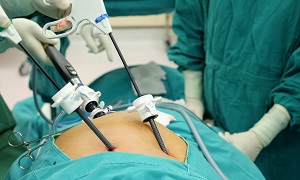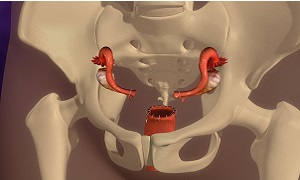Best Doctors in India for Endometriosis Surgery
Best Hospitals in India for Endometriosis Surgery
- City: Mumbai, India
Hospital Highlights:
- Fortis Hiranandani hospital was established in 2007.
- The hospital is an advanced tertiary care, multi-specialty hospital equipped with 149 beds.
- The hospital is equipped with a super ICU to provide emergency medical care to critically ill patients.
- The hospital is NABH accredited.
- The critical care facility in the hospital is augmented with the state-of-the-art facilities that facilitate speedier diagnosis and efficient monitoring.
- The hospital provides specialty medical services in cardiology, orthopedic science, pediatric science, neurology, diabetic care, urology, nephrology, ENT, obstetrics, gynecology, cosmetic surgery, bariatric surgery, neuro and spine care.
- City: Gurugram, India
Hospital Highlights:
- W Pratiksha Hospital, Gurugram, is one of the best hospitals in the NCR region. It is also a top hospital in India for IVF. Since its inception, the hospital has performed over 5500 successful IVFs. The hospital also specializes in gynecology.
- With over 20 years of experience in providing quality healthcare, the hospital is known as one of the most trusted and valued health providers in India.
- Equipped with world-class medical facilities and advanced technology, the hospital’s doctors and clinicians also have a track record of delivering excellent results. The hospital is also known for focusing on preventive well-being as much as on curative treatment.
- The hospital has earned the trust of its patients, by providing the best available treatments at affordable costs.
- City: Gurugram, India
Hospital Highlights:
- Paras hospital was established in 2006 and is the 250 bedded flagship hospital of Paras Healthcare.
- The is supported by a team of doctors of international and national repute.
- The hospital is NABH accredited and also the first hospital in the region to have a NABL accredited laboratory.
- The hospital provides specialty medical services in around 55 departments including Neurosciences, Joint Replacement, Mother & Child Care, Minimal Invasive Surgery, Gynecology and Obstetrics, Ophthalmology, Dermatology, Endocrinology, Rheumatology, Cosmetic and Plastic surgery.
- The hospital is equipped with state-of-the-art technologies.
- City: Kolkata, India
Hospital Highlights:
- Fortis Hospital, Anandapur, Kolkata is a world-class super-speciality equipped with the latest technologies in the medical world.
- The hospital is NABH accredited.
- This state-of-the-art facility specializes in cardiology and cardiac surgery, urology, nephrology, neurosciences, orthopaedics, digestive care, emergency care and critical care.
- The hospital, governed by integrated Building Management System (IBMS), has a pneumatic chute system, for quick vertical and horizontal transportation between floors, facilitating speedy transfer of patient specimens, documents, reports, and medicines to the concerned departments.
- The hospital also has a nephrology department with over 28 advanced dialysis units.
- City: Mumbai, India
Hospital Highlights:
- SL Raheja hospital is a 140-bed multi-specialty tertiary care hospital that is being managed by Fortis Healthcare Ltd.
- The hospital is a benchmark in healthcare and medical facilities in the neighborhood of Mahim & the western suburbs.
- L.Raheja Hospital, Mahim has one of the most effective ICU and Casualty care services.
- The hospital provides specialty medical services in Cardiology, Oncology, Neurology, Orthopedics, Mother & Child Care, and in Diabetes.
- City: Mumbai, India
Hospital Highlights:
- Wockhardt Hospitals were established in the year 1973, originally called First Hospitals and Heart Institute.
- Wockhardt Hospitals are super specialty health care networks in India, nurtured by Wockhardt Ltd, India’s 5th largest Pharmaceutical and Healthcare company.
- Wockhardt Hospitals is associated with Partners Harvard Medical International, an international arm of Harvard Medical School, USA.
- Wockhardt Heart Hospital performed India’s first endoscopic heart surgery.
- The hospital has a state-of-the-art infrastructure equipped with the latest technologies and modern equipment.
- It has special Centers of Excellence dedicated to the major specialties to provide hassle-free and high-quality clinical care.
- City: Gurugram, India
Hospital Highlights:
- The CK Birla Hospital in Gurugram is a NABH-accredited multi-specialty hospital.
- The hospital strives to increase the quality of healthcare by focusing on UK NHS nurse and midwife training requirements. Policies and practices derived from the National Institute for Health and Treatment Excellence (NICE) recommendations in the United Kingdom ensuring that a strong focus on safety, high-quality clinical care, and sanitation is maintained.
- The hospital’s cutting-edge technology and facilities allow for real-time communication and seamless collaboration among caregivers, ensuring accuracy and the best possible results. Those with foreign experience and accreditations make up part of the hospital’s team of clinicians.
- City: Ahmedabad
Hospital Highlights:
- As a member of the Apollo Hospitals Group, Apollo Hospitals International Limited, Ahmedabad is one of the most popular and sought-after medical facilities in Gujarat.
- Through its 6 Centres of Excellence and various affiliated branches, which cover all specialties and subspecialties, the hospital provides the most advanced clinical services.
- Since its inception in 2003, the hospital has been providing each patient with the most up-to-date medical equipment and state-of-the-art technology.
- With more than 150 successful organ transplants, including liver and renal transplants, the facility has been able to build a strong and extensive organ transplant program.
- In addition to performing 600 surgeries and caring for over 1800 patients on an IP basis, the hospital sees more than 18,000 patients on average in the outpatient department.
- With one of the biggest cardiology teams in the area, the hospital provides state-of-the-art regional care treatment in Cardiac Sciences.
- Additionally, the hospital offers a broad range of Neuro Interventional techniques to help stroke patients recover more quickly.
- City: Noida, India
Hospital Highlights:
- Jaypee Hospital is the flagship hospital of the Jaypee Group.
- This hospital has commissioned 525 beds in the first phase and has been planned and designed as a 1200 bedded multi-specialty facility.
- It holds the accreditation of the NABH and NABL.
- The hospital has state-of-the-art infrastructure equipped with the latest technologies and modern equipment like 64 Slice PET CT, Dual Head 6 Slice SPECT CT, Gamma Camera, and Da Vinci Robotic Surgery for comprehensive robotic surgical solutions.
- It has special Centers dedicated to the major specialties to provide hassle-free and high-quality clinical care.
- City: Mumbai, India
Hospital Highlights:
- Reliance Hospital is one of the best super-specialty care hospitals in Navi Mumbai.
- The main purpose of this hospital is to become a trustworthy place for the best health and hope for society. The hospital is well connected to the suburbs of Mumbai and Navi Mumbai.
- The hospital has various specialty departments, viz., Accident & Emergency, Anesthesiology, Dental Services, Dermatology, Diabetology, Dietetics Nutrition, Endocrinology, ENT, Gastroenterology, General Surgery, Gynaecology And Obstetrics, Hepato Pancreato Biliary Surgery, Infectious Disease, Internal Medicine, Interventional Radiology, Laboratory Medicine, Minimal Access Laparoscopic Surgery, Nephrology, Neurosciences, Opthalmology, Orthopaedics, Paediatrics, Pain Management Palliative Care, Physical Medicine Rehabilitation, Plastic And Reconstructive Surgery, Psychiatry, Pulmonary Medicine, Radiology, Rheumatology, Transplant, Urology Andrology, Vascular Surgery
Endometriosis Surgery
Endometriosis is an ailment that causes tissue growing normally on the inside lining of the uterus to implant in other parts of the abdomen. The misplaced tissue can lead to symptoms like pain which can occur during a period, bowel movements or sexual intercourse. Having endometriosis also makes it harder for a woman to get pregnant.
Though surgery should be able to relieve your pain as well as improve your odds of conceiving, it can be difficult to know what to expect from surgery.
Purpose
Generally, two main treatments are used by doctors for endometriosis, i.e. medicine and surgery. Surgery is never considered as a first response. It is only considered when medications fail to provide you the desired results.
Surgery is also considered if you are trying to get pregnant but have not been successful. The odds of getting pregnant usually increase after the endometriosis tissue is removed.
It is important to note that you need to discuss properly with your doctor if you are considering surgery, as it is a big decision, especially if you are considering a hysterectomy, which can remove your uterus and possibly your ovaries as well. Without ovaries and a uterus, pregnancy is not possible.
Types
Two main types of surgery are used for treating endometriosis:
- Conservative surgery is for removing as much of the endometriosis tissue as much as possible. But this procedure can preserve your reproductive organs, i.e. ovaries and uterus. This procedure is generally done through small incisions, known as laparoscopy. Laparoscopy can be used for diagnosis as well.
- Hysterectomy is for treating more severe endometriosis. The surgeon first removes your uterus, as well as possibly your cervix and ovaries. If you undergo this procedure, pregnancy will no longer be possible.
Preparation
Your doctors might ask you to avoid certain kinds of medications, before your surgery. You also need to avoid smoking for as long as possible, before and after surgery.
On the day of the surgery, your doctor will advise you not to have any food or liquid for at least 8 hours before the procedure.
Your doctor might also ask you to take a laxative to empty your bowels completely before the surgery.
Procedure
Laparoscopy
The most common procedure for diagnosing and removing mild to moderate endometriosis is laparoscopy.
First, you will be given anesthesia, so that you will not feel any pain. Then your doctor will fill your belly with gas, as this will allow your surgeon to see inside your abdomen.
Next, a few small incisions will be made near your belly button. A lighted scope will be inserted into one of these incisions.
Surgical instruments are going to be inserted into one of these openings.
Using knife, heat or laser, your doctor will be removing as much of the endometriosis tissue as possible, from your organs such as the bladder, ovaries, fallopian tubes and rectum. A sample of this tissue might be sent to the lab for testing. The surgeon will also remove any scar tissue in these organs. At last, your incisions will be closed up as well.
In most cases, a patient should be able to return home the same day of the surgery.
Hysterectomy
Vaginally
The surgeon will first make an incision in your lower pelvis and remove the uterus and other reproductive organs through the incision.
Hysterectomy
The surgeon removes your uterus and your cervix through the vagina, without making any incision.
Laparoscopically
Few small incisions are made in your abdomen. Through these incisions, your surgeon will be removing your uterus and possibly your cervix.
Aftercare & recovery
You should recover faster after laparoscopic surgery than after an open hysterectomy. For the first few days, your activities might be limited after the procedure. Discuss with your surgeon when you should be able to go back to driving, working or exercise. Generally, a full recovery from a hysterectomy can take four to six weeks.
If you undergo a hysterectomy, you will not get a period anymore.
Although surgery can help in relieving pain and laparoscopic surgery can help you get pregnant. It doesn’t necessarily cure endometriosis, even if you undergo a hysterectomy. You might still experience symptoms if you have any endometriosis tissue left in your abdomen.
In around 20 to 40 percent of women, symptoms generally come back within five years. The remaining tissue can continue to grow, and it is not possible to remove every cell of misplaced tissue.
Risks
Although endometriosis surgery is generally safe, like all surgeries it may have few risks, which can include bleeding, infection, damage to any nearby nerves or blood vessels, as well as an abnormal connection between two organs in the abdomen.
If you experience any symptoms such as fever over 38 ° Celsius, redness or swelling at the incision site, heavy bleeding in your vagina or the incision site, or severe pain, then you need to contact your doctor.













